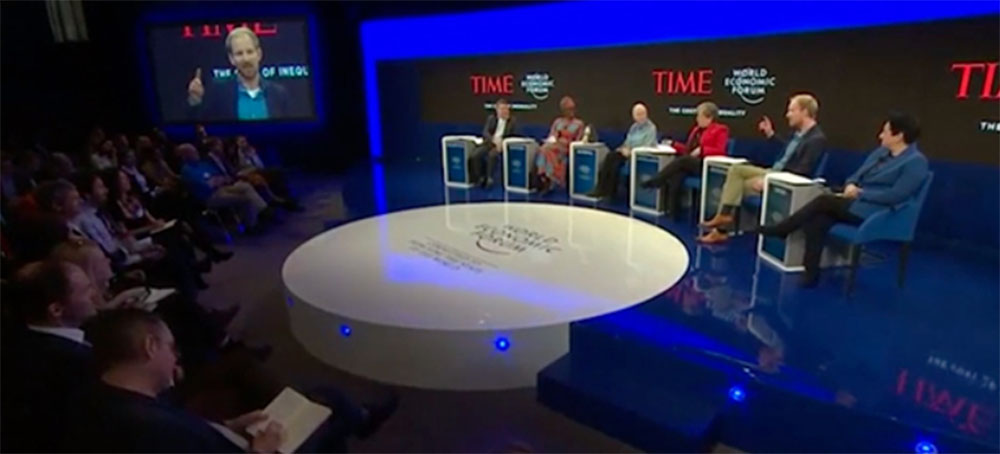Rutger Bregman: "Taxes, Taxes, Taxes the Rest Is All Bullshit"
Razzan Nakhlawi ICIJ Rutger Bregman (second from the right) at the World Economic Forum in Davos in 2019. (photo: ICIJ)
Rutger Bregman (second from the right) at the World Economic Forum in Davos in 2019. (photo: ICIJ) Rutger Bregman: "Taxes, Taxes, Taxes the Rest Is All Bullshit"
Razzan Nakhlawi ICIJ
After Bregman’s taxation rant at the World Economic Forum blew up, we sat down to talk tax hikes on the super-rich.
“We’ve got to be talking about taxes,” he declared. “That’s it, taxes, taxes, taxes.”
Shutting down tax avoidance schemes and forcing the wealthy to pay more in taxes is the only real solution to the problems that plague the world, he said — but the uber rich who swooped into town in their private jets didn’t even want to talk about it.
“It feels like I’m at a firefighters conference, and no one is allowed to speak about water.”
Bregman’s rant blew up online, but he suggests his virality comes with growing public support for fairer taxation. He cites the International Consortium of Investigative Journalist’s extensive reporting into secretive financial structures in places like Panama, Bermuda and the British Virgin Islands, as a catalyst for the shift.
We sat down with Bregman to talk tax hikes on the super-rich and his infamous run-in with American conservative television personality Tucker Carlson.
The interview has been edited for clarity and length.
How did you get interested in the issue of inequality?
I see history as a tool to show people that the way we’ve structured our society and economy right now is not inevitable, you know, that it can all change. In that sense, I think that history is one of the most subversive of all the sciences because it just opens your eyes to all the possibilities out there.
You can have a whole long theoretical debate about how high should the top marginal tax rate be. Some people would say, well, a top marginal tax rate of 70 or 80%, that’s ridiculous, that will never work, that will destroy our economy. But you could also just look at history and then you’ll just find out that in the 50s and 60s, we had those kinds of tax rates under often conservative politicians, like [Dwight D.] Eisenhower, as I mentioned at Davos. And, it worked perfectly well.
It just opens your eyes. Just to see that things were often radically different in the past.
So often we talk about these issues as zero-sum policies: I take a bit from you so that I can give it to someone else. The actual evidence shows that there are a lot of win-win policies out there. That if you eradicate poverty, that healthcare costs go down, crime goes down, kids perform much better in school. Every dollar you invest, you get a return of three or four dollars.
Even if you don’t have a heart, at least you have a wallet, right? I think that’s very important to emphasize, it’s also what I’ve tried to do in Davos, is to emphasize that it’s not really about partisanships, these are really bipartisan ideas. I don’t think we’re at a point where this is about left versus right, but it’s more about plutocracy versus democracy.
How do you view tax as part of the inequality ecosystem or a “means to an end”?
A couple of days ago, Nancy Pelosi [speaker of the United States House of Representatives] asked a question about Medicare-for-all. She asked, “How are we ever going to pay for that?” My answer was, again, taxes, taxes, taxes. It’s not very difficult.
If you look around the globe, you just see that the countries with the strongest welfare state, the strongest systems of social support and higher levels of taxation are also the places where people actually want to live. If you ask citizens from around the world, imagine the perfect country: what level of inequality would it have? What level of social mobility would it have? They say, well, something like Denmark sounds good. I always say this, if people want to experience the American dream, just move to Denmark. Your chances are much higher there.
Where are you seeing resistance to these ideas?
Davos, for example. I mean, it was a very weird experience I had. People talking about all sorts of issues: inequality, about feminism, about participation, about inclusion, all such wonderful things. But they don’t talk about taxes. I was at the one panel where tax avoidance was the main subject.
It was a small panel, and there was one journalist, Bastian Obermayer, from [ICIJ’s German partner] Süddeutsche Zeitung, the one who received the Pulitzer Prize [for the Panama Papers]. And, it took I think about 40, 45 minutes before he actually got the opportunity to say something. It was a bizarre experience. We were mainly listening to the minister of finance from Ireland, a notorious tax paradise, explaining how wonderful Ireland is and how they’re really not a tax paradise anymore, blah, blah, blah. Bastian was basically ignored by the rest of the panel. So, that was really the moment when I really decided, okay I’m going to make a speech about how bizarre this whole conference is.
